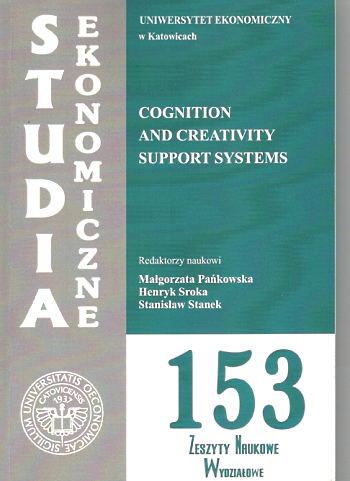
Publisher: University of Economics in Katowice (2013)
201 pages
ISSN 2083-8611
Cognition and Creativity Support Systems
Studia Ekonomiczne Zeszyty Naukowe 153
Malgorzata Pankowska, Henryk Sroka, Stanislaw Stanek (eds.)
Perception of the creative formation of organizations has changed dramatically during the past years. For a long time, creativity was considered in terms of managing a small business or being an artist. However, creativity is not directly associated with the particular context. We can consider essentially context-free organizational creativity. Nearly the same was for cognition. Previously, cognition was linked with abilities to perceive and recognize, nowadays it is developed as foundation of artificial intelligence. Cognition and creativity are equally likely to be present in corporations' development efforts and in the identification of new markets and technologies as in the project of public organizations or in the organization of universities. Creative activities are taking place when neither the goal nor often the initial conditions are known at the start, but constructed during the process. Taking into account the discussion above, the research articles included in this book use the terms cognition and creativity to refer to an individual or a community of individuals that realize their business supported by ICT in their operational environments.
The aim of this book is to improve our understanding of cognition and creativity support system environments. The various research articles analyse creative and innovative activities in the case studies or just through provision of academic discussions. The book's focus is on identifying and understanding the factors relating to the working environment that are conducive to human creativity and cognition.
The book is likely to be of interest to students and scholars in a number of research fields as well as to business policy decision makers concerned with research, teaching and policy measures for the development of cognitive information systems and creativity support system environments.
![Send mail [Send mail]](mailto.gif)

![Homepage [Home]](back.gif)